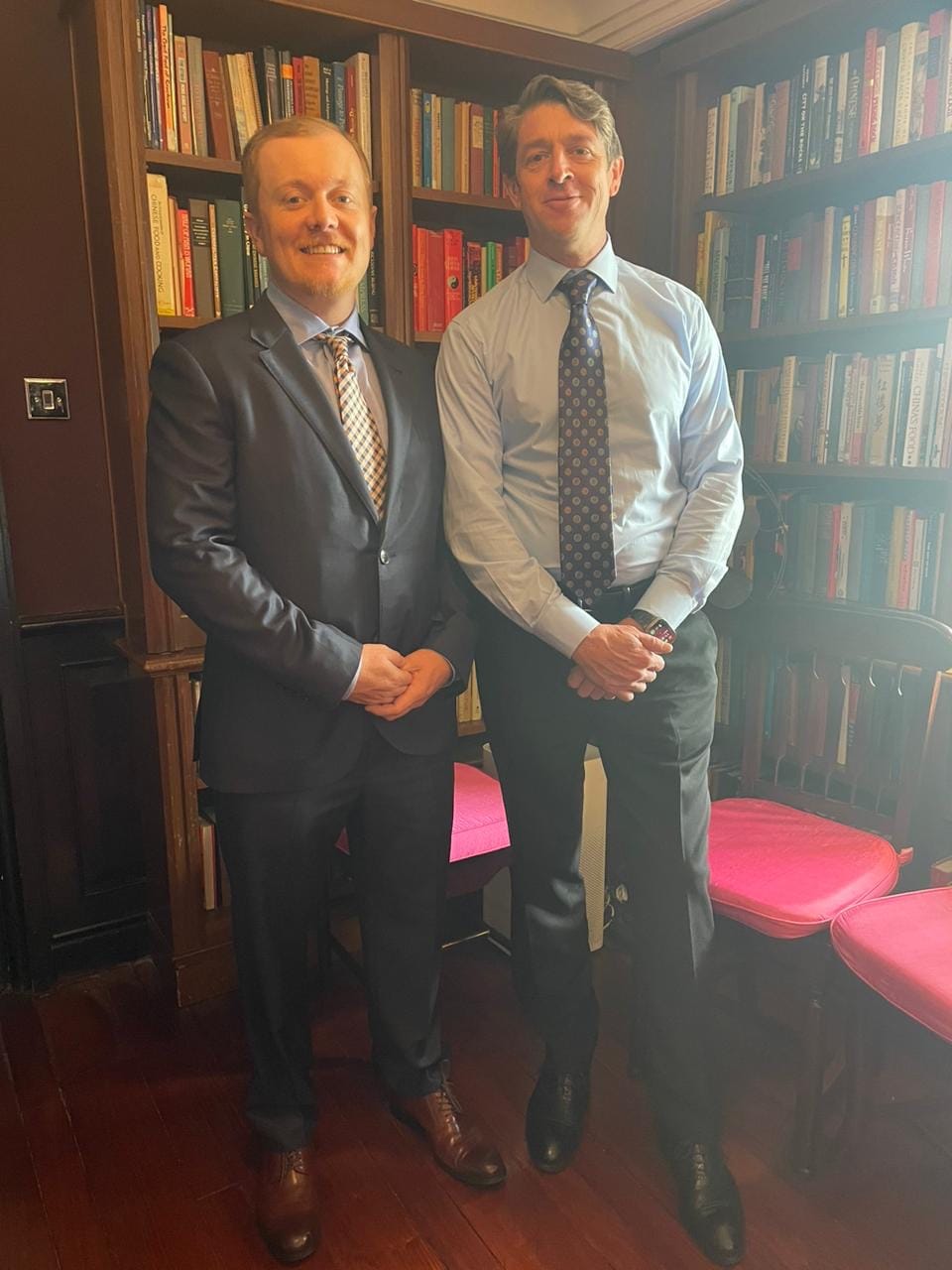UAE/HK Takeaways Part II: China, And The Power Of The Status Quo
Maybe things won't change as quickly as everyone expects.

This article is Part II in a series of articles discussing Bryce's takeaways from our round-the-world trip.
Bryce here. Cody will do chat on Friday at 12:00pm ET in the Discord channel or as always you can email us at support@tradingwithcody.com.
Before we get into the meat of today's article, we had to share a new amazing AI product that our friend John Deo shared with us on yesterday's AI Revolution call: it's called NotebookLM and it's made by Google.
With NotebookLM, you can upload up to 50 sources of information, from PDFs, to website links, to pasted text, and the AI will summarize it, generate a one-page briefing doc, and most importantly, generate a very-realistic sounding two-person podcast about the sources (without any prompting)!
John made this one about yesterday's UAE article in about 30 seconds by simply copying and pasting the text from the article (along with a link to TradingWithCody.com) into the AI:
I made the below podcast by simply pasting the URL for Tesla's last four quarterly reports into the software (again, no prompting):
And here is the podcast about today's article in case you don't have time to read it:
Amazing stuff!
Who knows what the world of AI will look like in 5, 10, or 27.39 years (which is roughly 10,000 days)!
China, And The Power Of The Status Quo
"It was not our common beliefs which brought us together. But our, frankly, our common interests and our common hopes. What are those common interests? One is the interests that both of us have in maintaining our integrity and our independence. And second is the hope that each of us has to try to build a structure of peace in the Pacific, and going beyond that, in the world.
And on that point, that means that despite a total gulf, a gulf that will continue to exist as long as they're communist, and as long as we’re basically a free country, a total gulf in beliefs that people of different faiths, of different beliefs, have got to find a way to live together in this world.
And, too, in the case of the People’s Republic of China and the United States of America, the most powerful nation in the world, and the most populous nation in the world, if we do not find a way to, despite our differences, to have discussions, we are on a collision course years ahead, which would be very, very serious. If we do find a way to have discussions as we have started in this instance, there is a better chance that we will not have that collision course years ahead."
– Richard Nixon to his advisors, including Henry Kissinger, in 1972 after becoming the first sitting US President to visit mainland China in history and normalizing relations with the People's Republic of China (PRC).
Despite his many failings, President Richard Nixon recognized something when he visited China in 1972 and became the first sitting US President in history to do so. As detailed in his quote above, Nixon recognized that the US and China have at least two "common interests" that unite the two powerful and populous nations: national independence and relative world peace.
Even though US-China relations are rocky right now (to say the least) our trip to Hong Kong made clear to me that those common interests Nixon recognized over 50 years ago still exist. For that reason–and because I think the spiderweb of issues between the two nations is too complex to be easily resolved in the short term–I think that the US-China status quo may end up persisting for much, much longer than people think.
Moreover, I think that's actually bullish for the US, the PRC, and even Taiwan as I discuss below.
As you probably know, we spent the latter part of our trip (about six days) in Hong Kong, which is a "Special Administrative Region" within the People's Republic of China (PRC).
We spent a lot of time discussing the state of the Chinese economy, US-China relations, and the possibility of Chinese tech companies overtaking their US rivals. By the way, Hong Kong is only an hour-and-a-half flight from Taipei (the capital of Taiwan).
There are a lot of really thorny issues when it comes to China right now, and obviously, there are no easy answers. In fact, these are some of the most complex issues facing the world today.
But what I realized after thinking about China, Hong Kong, Taiwan, and the US for a while, is that maybe that extreme level of complexity, in and of itself, is giving us part of the answer. I started to appreciate the power of the status quo.
Right now, everyone is on edge and expecting some sort of major change in the way things are between the US and China.
People are wondering: Will China's economy implode?
Will the PRC bring Taiwan back into the fold?
Will the US successfully build a domestic semiconductor manufacturing base in order to reduce reliance on Taiwan?
Will Chinese tech companies overtake their US rivals (think Huawei vs Apple and Nvidia or BYD vs Tesla)?
But when you go to Hong Kong and you see the buzz and you start to understand just how important Hong Kong and Taiwan and China are to the global economy, you can understand that nobody (neither China nor the US nor Taiwan) really wants to upset the status quo in any sort of radical fashion.
Why?
Even with tensions high, things are still pretty good for most people in China, Hong Kong, Taiwan, and the US right now by historical standards (emphasis on "pretty" and emphasis on "most," as there are always lots of people suffering around the world).
And the likely result of a big change in the status quo (i.e. declining international trade, inflation, isolationism, possible war, etc.) is far worse than the way things currently are. We would be on a "very, very serious collision course" as Nixon put it.

Moreover, the status quo (as a general principle) is a powerful thing because people are almost always averse to change. Change is hard, it's often painful, it brings uncertainty, and most ordinary people aren't interested in radically changing the way they do things.
Most people just want to provide for their families and try to enjoy life without worrying about geopolitical risks or worrying about what life might be like under a different system of government. Most people oppose the idea of war, and most people are not super-pumped about the idea of dying in one.
With respect to Taiwan, this idea is actually supported by recent polling, with one poll showing that 80% of the Taiwanese people prefer to keep the status quo with China, rather than move toward full-blown independence.
Let's also consider the Taiwan issue from a US perspective for a moment. Despite the frequent grandstanding from US politicians about freedom and democracy, the US really doesn't want to go to war with China over a faraway island in the Pacific that was considered part of the mainland for many, many years anyway.
The primary reason the US cares about Taiwan is the island's importance to the global semiconductor supply chain.
On the other hand, the PRC is interested in Taiwan because it is a direct challenger to the authority of the PRC, and there are deep-rooted historical differences between the political systems of the PRC and Taiwan going back to the Chinese Civil War.

So we end up with a situation where the US won't let the PRC overtake Taiwan at the moment because the US needs the chips, and the PRC probably doesn't want to overtake Taiwan right now because it doesn't want a direct conflict with the US.
Which brings us back to square one: things will likely go on as they are.
Going back to the Nixon quote earlier, both nations still have a shared interest in maintaining both sovereign independence and relative world peace.
For over fifty years, the US and China have co-existed and grown substantially, both in terms of economic and military strength, despite having radically different views on the way the world should work.
Importantly, over time, the economies of the two countries have become dramatically more intermingled. In many ways, the US and China are dependent on each other for survival.
Today, many US firms including Tesla, Apple, McDonalds, Intel, Nike, and others have significant investments in China. Others still – like Nvidia, Texas Instruments, Starbucks, and McDonalds – generate a large chunk of their sales from China.
And the Chinese economy is largely built around manufacturing goods that are bought by the US and other Western economies. China needs foreign companies to continue to invest in its export-based economy in order to continue lifting its massive population out of poverty and into the middle- and upper- classes.
Therefore, I think what Nixon saw in 1972 – a state of cooperation and co-existence by two politically divergent countries – is likely to persist for some time. Everyone seems to be expecting all of these major issues to come to a head in the near term, and I just think the situation is simply too complex to unravel overnight.
If it does, the result would be ugly (to say the least). And I think that is something that everyone would prefer to avoid. Again, the Nixon administration recognized this over fifty years ago.
Of course, the leaders in the PRC and the US will continue their grandstanding for political purposes, and sure there may be some saber-rattling here and there, but perhaps the thing that nobody expects would be the status quo persisting for many, many years.
Lastly, I think the persistence of the status quo is relatively bullish for the US, the PRC, and Taiwan. US tech companies will likely continue to dominate their Chinese rivals in terms of both innovation and value creation (Huawei is not Apple, Baidu is not Google, Alibaba is not Amazon, and BYD is not Tesla).
Taiwan will continue to manufacture nearly 100% of the world's most advanced semiconductors, while the country relies on what amounts to a defense guarantee from the US. And China will likely continue to trade with the US and do everything it can to encourage foreign direct investment while continuing to threaten Taiwan without actually following through on that threat.
While this situation may be uncomfortable, it's the one we've got, and it's the one that has worked for over fifty years now.
Who's to say it cannot work for another fifty years?
Disclaimer: I am not a foreign policy expert and I wrote this article following my first-ever visit to Hong Kong. I've never been to mainland China or Taiwan, and I appreciate there are many things about those countries I still don't understand. Accordingly, I reserve the right to change my views on this subject in the future.






